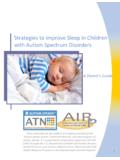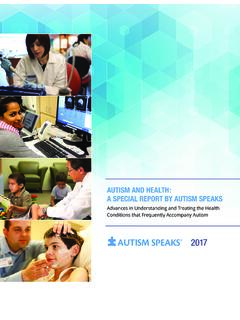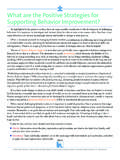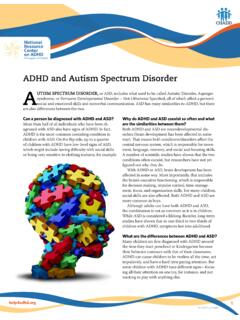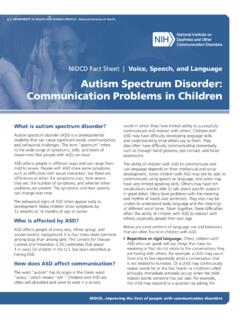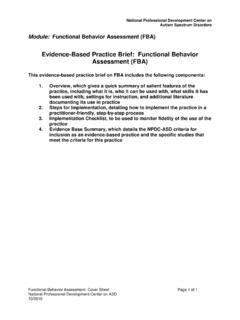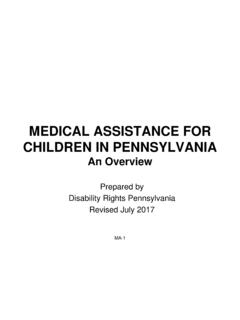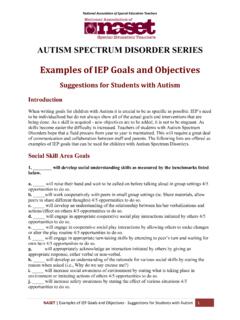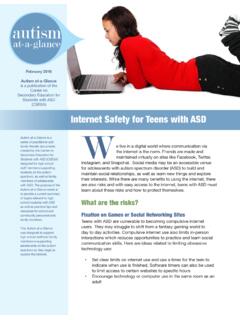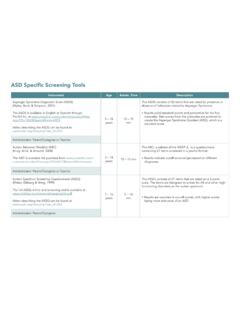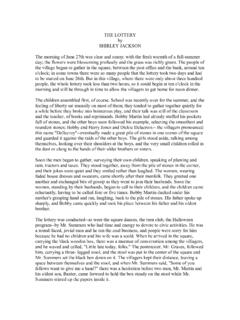Transcription of Parent’s Guide to Feeding Behavior in Children with Autism
1 Parent s Guide to Feeding Behavior in Children with AutismThese materials are the product of on-going activities of the Autism Speaks Autism Treatment Network, a funded program of Autism Speaks. It is supported by cooperative agreement UA3 MC 11054 through the Department of Health and Human Services, Health Resources and Services Administration, Maternal and Child Health Research Program to the Massachusetts General Hospital. Its contents are solely the responsibility of the authors and do not necessarily represent the official views of the MCHB, HRSA, HHS, or Autism Speaks.
2 A Parent s Guide to Exploring Feeding Behavior in Autismpresented by Autism Speaks ATN/AIR-PFeeding issues are common in Children with Autism spectrum disorders (ASD). Feeding can be very stressful for the child and for the family. Helping your child overcome Feeding issues can be a long, slow journey, but it is well worth the reward of better health and food can present a significant challenge for Children with ASD. Language delays (for example) can limit a child s ability to report pain and discomfort that might be interfering with tool kit is designed to help families affected by ASD understand eating behaviors, give guidance on how to address Feeding issues, and review some common questions that families have about eating Williams, , Dalrymple, N.
3 & Neal, J. (2000). Eating Habits of Children with Autism . Pediatric Nursing, 26 (3), What are Feeding problems and why do Children with ASD have them?Believe it or not, Feeding is a complicated human Behavior . Feeding Behavior is dependent on a person s developmental status. Medical, maturation and body mechanics issues relate to oral-motor abilities. How food tastes, smells and feels (sensory issues) and our experiences related to food also impact Feeding . When all of these areas work well, Feeding goes well. If there are problems in one of these areas, Feeding Behavior can be involves every sensory system (touch, sight, taste, smell and sound).
4 Many Children with ASD have difficulties with sensory processing and this can make eating certain foods a challenge for them. Children with Autism can also develop behavioral problems at mealtimes. For example, Children may learn that they can leave the table and play after refusing a food they do not found that 69% of Children with ASD were unwilling to try new foods and another 46% had rituals surrounding their eating problems in any child can be stressful for both the child and parents. Children need appropriate nutrients and calories to maintain good health and appropriate growth may be possible to address a Feeding problem in a child who has ASD by following these recommendations.
5 When your child s Feeding problems have significant consequences, you should seek professional can present a significant challenge for Children with ASD. Language delays (for example) can limit a child s ability to report pain and Parent s Guide to Exploring Feeding Behavior in Autismpresented by Autism Speaks should I be concerned? If your child is losing weight or showing signs of poor health If your child is eating fewer types of foods or has few foods in his or her diet If mealtime behaviors are causing stress Medical ConditionsBehavioral/Developmental ConditionsAre there medical conditions that might affect Feeding ?
6 Is your child reacting to stomachaches or pains? If your child will not eat, this may be his or her way to avoid stomach problems. Constipation may also make your child have stomach cramping and cause food refusal. Problems such as acid reflux or stomach upset caused by medicines your child takes daily may cause stomach pain and make him or her not want to eat. Concerned about constipation? Look for our Autism Speaks ATN/AIR-P s Guide for Managing Constipation in Children at Does your child have a food allergy?
7 If you notice a food your child eats regularly causes GI upset or a rash or other symptoms, a food allergy may be present. You and your primary care provider (PCP) might decide to consult a specialist, such as an allergist or a GI specialist, for further evaluation. While less likely for Children with ASD, tooth problems or swallowing issues may need to be ruled out as medical reasons for Feeding there behavioral/developmental conditions that might affect Feeding ? Is your child responding to the sensory aspects of his or her food?
8 Keeping notes on what your child eats, how much he or she eats, what he or she refuses to eat, and his or her Behavior during mealtimes can give you and your PCP some clues about any food sensitivities. Difficulties with behaviors can add to Feeding difficulties. Has your child s negative Feeding Behavior been accidentally reinforced? Has your child learned over time that being upset or angry allows him or her to get out of an uncomfortable situation? For example, being able to leave the table and go play after turning down food can make it more likely that your child will refuse again so that he or she can go play.
9 Is your child s difficulty in understanding and using language complicating Feeding ? If your child has trouble paying attention, following rules or being compliant with your requests, he or she may have difficulty understanding what you are expecting of him or her at do I do now?1. Start with your child s primary care physician (PCP). Your PCP can help you decide how to proceed. Often your PCP can manage these problems. However, you may need to include other professionals on your team to help rule out medical issues.
10 You may also need to bring in other professionals to help address the Feeding problems. 2. Along with your family and your PCP, who else may be on this team? Medical specialists such as allergists or GI doctors, psychologists, speech therapists, occupational therapists, registered dieticians or behavioral specialists trained in Feeding issues may be asked to give recommendations or provide is important to ask if professionals know about Feeding issues and about Autism . It is OK for you to ask them about their experience before making an can approach this by asking questions like Do you see this type of problem often?
